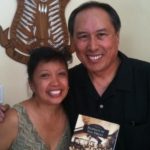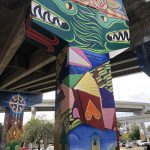You may be wondering what makes this class so different from any other class you have taken thus far in your academic career. When I enrolled in the class, I only knew that I would have to eventually interview somebody but did not realize how involved I would become with communities outside of UCSD. Race and Oral History in San Diego changed my relationship to studying history and conducting research. Studying was no longer just about reading books and endless PDF files but rather became about having conversations and learning how to find ways to improve a community and engage with your community partner. The best moments happened because I genuinely wanted to be a part of the community I worked with and opened myself up to them.
That leads me to my first piece of advice: Open yourself up to working in new environments. You will probably not even be sitting at a desk at any point for this class except when you are working on your own transcribing your oral history interview late into the night, struggling to make out that one word that might change the meaning of that sentence completely.
My second piece of advice: Embrace the weekly commute that you will be taking to a community center and share stories with the people who will become your good friends if you do not know them already. The hours you spend working on a presentation, putting together a curriculum for students or even grabbing a bite to eat after a long day will be so much more rewarding if you enjoy being with the people you are working with.
My last piece of advice: Be vulnerable and willing to share your own stories with the people you meet because they will be so much more willing to share theirs with you. Showing kindness and sincerity to your community partner(s), interviewee or the strangers you encounter along the way will make people feel comfortable with you. Sharing stories is a powerful ability. Do not forget that. You will learn so much from hearing people tell their stories.



